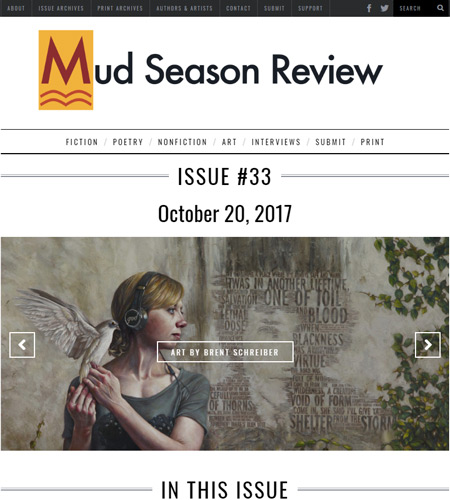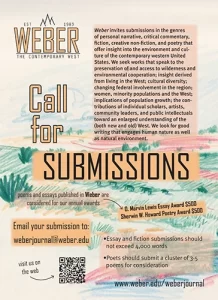Mud Season Review – October 2017
Issue 33, the latest from online Mud Season Review, promises something unique this month: instead of their usual format of three writers, one in each genre, the editors provide readers with a poetry-only issue. Fourteen poems from twelve poets tackle varying subjects, though it is the poetry that dealt with familial themes which stuck with me the longest.
Issue 33, the latest from online Mud Season Review, promises something unique this month: instead of their usual format of three writers, one in each genre, the editors provide readers with a poetry-only issue. Fourteen poems from twelve poets tackle varying subjects, though it is the poetry that dealt with familial themes which stuck with me the longest.
Moushumi Chakrabarty vividly writes of place in “Illegal,” beginning: “Imagining a landscape is easy / What is not / Is grappling with its spirit and pull.” There’s a quiet intimacy to this poem, Chakrabarty lovingly describing her home, from the fireflies guiding her to the “Rich perfume of earth” that runs in her veins, to her home “just at the end of the fields,” a home I imagined with dimly lit windows, warmth waiting for her. She describes her brother and his children, and wonders if he’s at home thinking of her as she is of him, leaving on a note of love and longing.
In “My Sister Posing in Front of the Arno” by Rachel Walker, the speaker compares her sister to Sandro Botticelli’s famous Venus, “the scrunchie / around your wrist and the teal / water bottle in the picture” the only things setting her apart from the graceful woman in Botticelli’s’ painting. In the painting, a goddess reaches to drape a cloth over Venus’s bared shoulders. Meanwhile, the speaker’s sister is offered a shawl by an older woman so the pair may be allowed to enter a building they were barred from due to the sister’s own bared shoulders. There is something so sweet and loving about being compared to such a beautiful, well-known painting, and Walker makes us feel the warm tone, clearly painting the snapshot for readers.
Jessica Lee takes writing about family in a different direction with “My mom found my condoms.” While the speaker’s parents clean out her “teenage bedroom/boudoir,” her mom discovers the paper bag filled with condoms that the speaker has left behind, along with other relics of her past sex life. I found part of me good-humoredly cringing inside, imagining the mother’s embarrassment, and the other part saddened as it dawns on the speaker that like these objects professing her sexuality, her sexuality itself will be shoved away in the back of a drawer to never be spoken of with her mother. She realizes they:
don’t speak the same sex-talk
and the intimacy I long to have
with her over a glass of wine
will never come, just as I fear
she never will come again, herself.
Yeesh—what an ending. I felt solidarity with the speaker, sharing in a sense of loss, unable to sit with her mother and be completely open with her about this one area of her life. Lee’s poem is an easy one to relate to and understand.
Kristian O’Hare’s “In the Lurch” is another relatable work, the speaker’s mother taking center stage in this piece as well. The speaker and his mother tear up the garden, O’Hare writing in images that bring her to life while creating a pleasurable set of words to read aloud:
Mom unyielding in her habit
of silence finally wields
the hand trowel & cleaves wild
into the spreading mass.
Together they work in a sort of frenzy until “a release, / we both feel it, we achieved something, /a sort of victory.” O’Hare invites us into the yard and into the workings of the speaker’s family: the mom’s quiet resolve, the father’s irritated attitude, the speaker’s urge to at first stay on the outskirts of the scene happening before him. Like Jessica Lee’s poem, O’Hare’s piece is intimate and real.
“Fragments” by Savannah Cooper gives information away in small pieces, little fragments spliced together. Between haunting, lonely descriptions of driving at night, Cooper’s speaker addresses an unnamed “you,” who took shape in my mind as perhaps the speaker’s miscarried child, though she could just as easily be addressing an ex-lover. These sections are promises of things the speaker would have done for this person: “I would have loved you hard / and well” and “I would have been your keeper” among these oaths. The night driving scenes cast an aura of being alone: the world is colorless, drivers in other cars are living separate lives and going their own ways, the aurora borealis shimmers out of reach. The speaker admits, “I am somewhere else,” somewhere with the person they’re making promises and apologies to, and as her passengers, we can only listen to the tidbits she gives us, piecing the fragments together in the darkness.
Other poets in the issue take on subjects other than family: Hussain Ahmed’s “Ice Cream and Blood” tackles the idea of blame and violence; Alexis Bates uses ripening bananas to explore a loss or a break up in “Unsolicited Advice (About That Boy)”; and D.S. Maolalai compares his bedroom to “A bowl of oranges,” clothing like peels on the floor, and of course “good on the side / with tequila.”
Take a chance on something different, break away from the usual, and enjoy the October 2017 issue of Mud Season Review.
[www.mudseasonreview.com]






